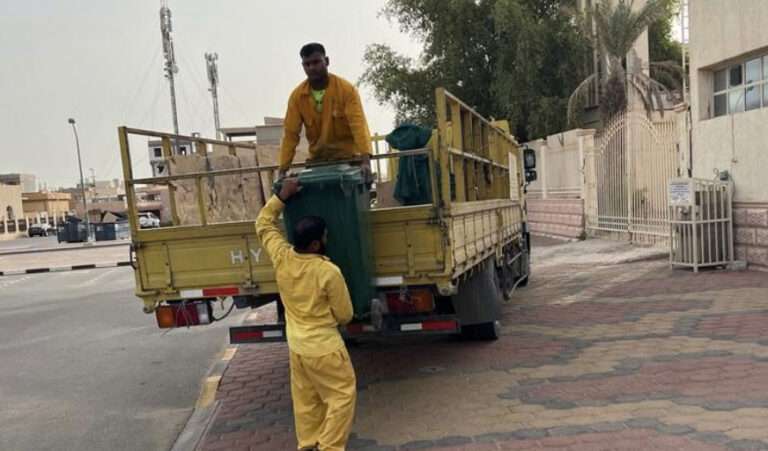Latest News
- 10 Infrastructure Projects Nearing Completion In Three Growing C...
- Kuwaiti Amir Sheikh Mishal Al-Ahmad Al-Jaber Al-Sabah Receives A...
- Kuwaiti Amir And Jordanian King Discuss Bilateral Ties At Basman...
- Internet Censorship Pact Condemned By MP-elect Bushehri
- Police Arrest Two Men Previously Convicted In Misdemeanor Cases
- The Theft Of 50 Birds In Kuwait’s Barr Abdaliyah Area
- Anti-Corruption Authority Efforts Embrace An Integrated Work Sys...
- European Union Keen On Exempting Kuwaitis From Schengen Visa
- Expat Admits Killing His Compatriot In A Quarrel Over Cash
- Decomposed Corpse Of A Girl Found In Nugra Flat
- 4.4% Private Sector Employment Sparks Concerns In Kuwait
- CSC Separates Job Appointments From Specific Agencies
Waste Collection And Disposal Costs Kuwait 285 Million Dinars Per Year

Kuwait appears uninterested and far from achieving its ambition, reports Al-Qabas daily, while nations around the world race to maximize the benefits of their waste by "recycling" it and reusing the damaged materials to create new profitable ones. Kuwait appears uninterested and far from achieving its ambitious goals despite successive industrial and technological development. The state’s losses appear to be large and growing, as a result of the costs of burying or burning waste, due to the severe damage this process leaves to the environment and human health.
In its Atlas of Waste Management in Kuwait, recently released by the Environment Public Authority, Kuwait spends about 285 million dinars a year on waste collection and disposal, within a ceiling of 7,500 tons of waste collected every day, and 50 percent of the country's waste is disposed of in landfills that are not ergonomically designed. The Atlas, a copy of which was obtained by Al-Qabas, pointed out that recycling operations in the country are carried out selectively, so that what is extracted from sand and slabs in the drums goes to fill the landfills and cover the waste layer there, which means the loss of valuable resources, and being affected by negative and harmful environmental effects.
In Kuwait, household waste is estimated to be 1.4 million tons per year. Farwaniya Governorate is the highest among the governorates in terms of waste volume with 415,419 tons, with an average daily share of 0.94 kilograms. It is estimated that 25.8% of Kuwaiti household waste is organic, plastic, paper, cardboard, packaging, glass, metals, etc.
In Kuwait, household waste represents 15 times the volumetric quantitative capacity of all 33 water towers, and on average each citizen contributes 0.85 kg. The Atlas stated that with regard to solid waste, citizens also generate waste outside their home, whether at work, restaurants or while shopping, and thus the daily amount of waste reaches 1.6 kg, which is much higher than the global average of 0.74 kg, and slightly higher than the average of the GCC countries which is 1.5 kilos. The sources pointed out that 1,000 tons of waste in the country is recyclable, mostly plastic, at rates of up to 14%, and cardboard, then glass, metal and wood, in addition to electrical and electronic waste at 1%.
Trending News
-
 Kuwait Implements Home Biometrics Services Ahead O...
14 April 2024
Kuwait Implements Home Biometrics Services Ahead O...
14 April 2024 -
 Kuwait Airways Provides Update On Flight Schedule...
14 April 2024
Kuwait Airways Provides Update On Flight Schedule...
14 April 2024 -
 Kuwait Airways Introduces Convenient Home Luggage...
15 April 2024
Kuwait Airways Introduces Convenient Home Luggage...
15 April 2024 -
 Expat Residency Law Amended By Kuwait Ministerial...
20 April 2024
Expat Residency Law Amended By Kuwait Ministerial...
20 April 2024 -
 Gathering For Eid Al-Fitr Prayers: Kuwaiti Citizen...
10 April 2024
Gathering For Eid Al-Fitr Prayers: Kuwaiti Citizen...
10 April 2024 -
 Two Expats Are Arrested For Stealing From Salmiya...
17 April 2024
Two Expats Are Arrested For Stealing From Salmiya...
17 April 2024 -
 An Egyptian Expat Dies At Kuwait's Airport
11 April 2024
An Egyptian Expat Dies At Kuwait's Airport
11 April 2024 -
 Bay Zero Water Park Kuwait: Summer Season Opens Ei...
11 April 2024
Bay Zero Water Park Kuwait: Summer Season Opens Ei...
11 April 2024 -
 Temperature Increases Cause Electricity Load Index...
21 April 2024
Temperature Increases Cause Electricity Load Index...
21 April 2024 -
 Kuwait Airways Resumes Flights To Beirut And Oman...
15 April 2024
Kuwait Airways Resumes Flights To Beirut And Oman...
15 April 2024












Comments Post Comment